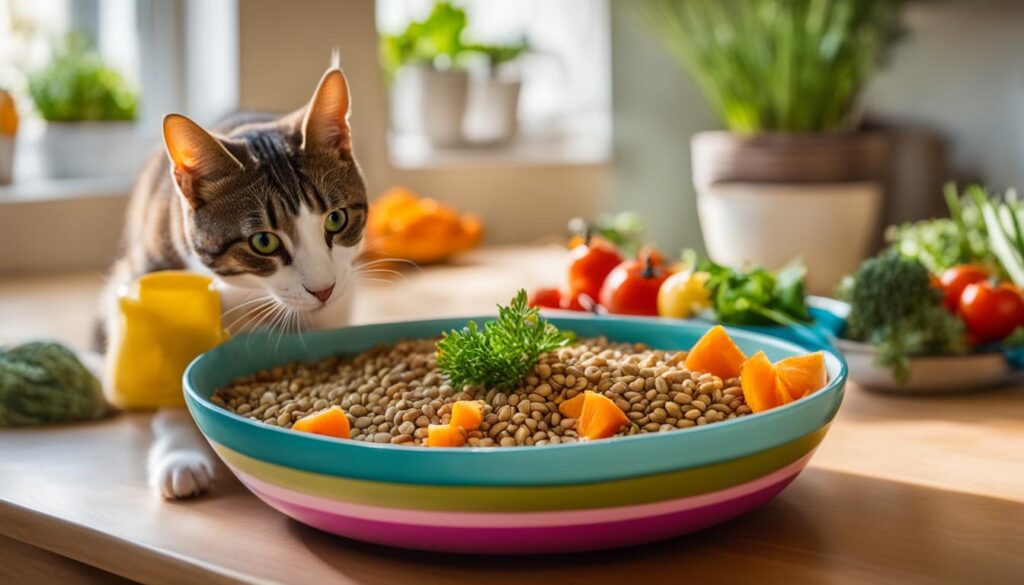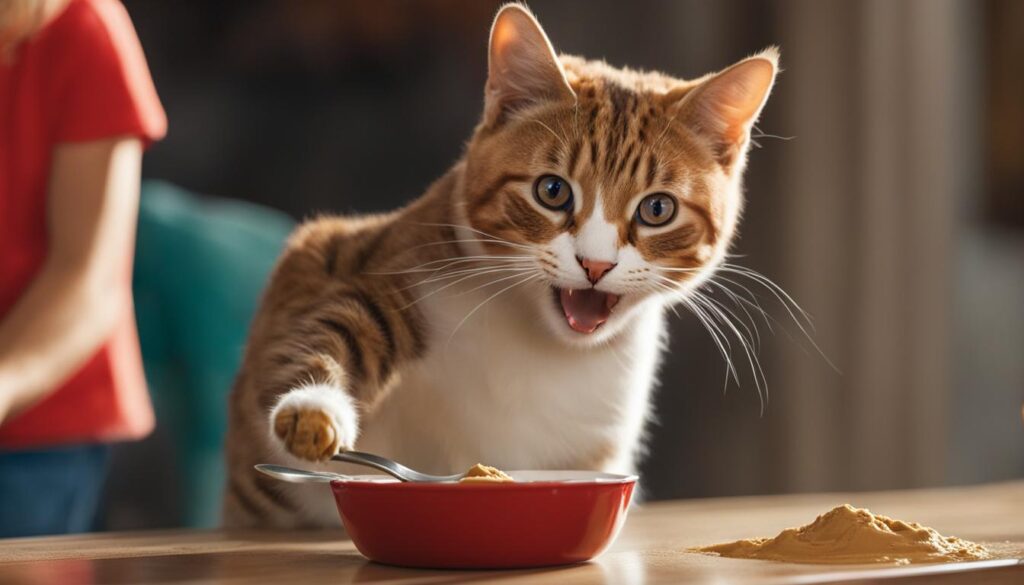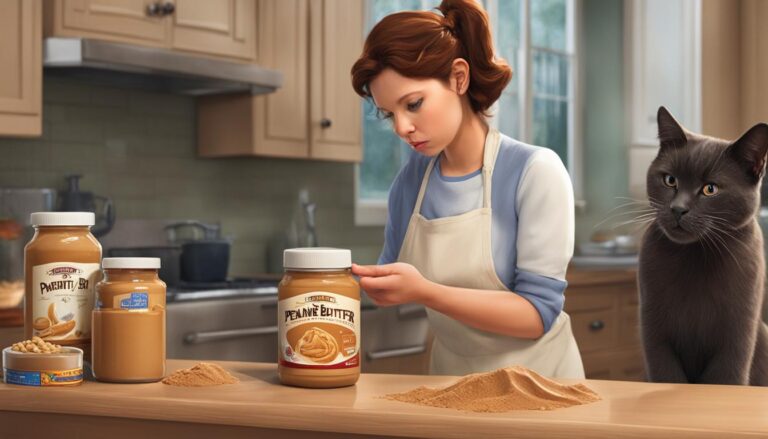Are you a proud pet owner of a feline friend? If so, you may have wondered whether it’s safe for cats to consume peanut butter. Well, the answer is not so straightforward. While some cats can tolerate small amounts of peanut butter, it’s essential to understand the potential risks and benefits before offering it to your furry companion.
Wichtigste Erkenntnisse:
- Cats can eat peanut butter in small quantities, but it is not nutritionally necessary for them.
- Some cats may be allergic or have difficulty digesting peanut butter.
- Feeding large amounts of peanut butter can contribute to obesity, diabetes, vomiting, and diarrhea in cats.
- Peanut butter does not provide any nutritional benefits for cats and can be replaced with healthier alternatives.
- It is always best to consult with a veterinarian before introducing any new foods into your cat’s diet.
Can Cats Eat Peanut Butter? The Risks and Benefits Explained
While peanut butter may be a tempting treat for cats, it’s important to understand the potential risks and benefits associated with feeding it to our feline friends. While peanut butter itself is not toxic to cats, there are some risks to consider. Feeding large amounts of peanut butter can be a choking hazard and contribute to obesity, diabetes, vomiting, and diarrhea. However, when given in moderation, peanut butter can be used as a treat or to administer medication.
It’s worth noting that peanut butter does not provide any nutritional benefits for cats. Unlike humans, cats are obligate carnivores, which means they require a diet rich in animal-based protein. Therefore, peanut butter should not be a regular part of their diet and should be replaced with healthier treats that are more aligned with their nutritional needs.
When it comes to cats and allergies, peanut butter allergies are rare, but they can occur. Signs of an allergic reaction may include itching, hives, swelling, and difficulty breathing. Additionally, peanut butter can cause digestive issues such as vomiting, diarrhea, and abdominal discomfort. If your cat shows any of these symptoms after consuming peanut butter, it is best to consult a veterinarian for further guidance.
| Risks of Feeding Peanut Butter to Cats | Benefits of Giving Cats Peanut Butter |
|---|---|
| Choking hazard | Treat option |
| Contributes to obesity | Can be used to administer medication |
| Can lead to diabetes | |
| May cause vomiting and diarrhea |
Ultimately, while cats can eat peanut butter in small quantities, it is important to consider their overall health and nutritional needs. There are healthier alternatives, such as tuna or chicken, which provide valuable nutrients for cats. Always consult with a veterinarian before introducing any new foods or treats into your cat’s diet to ensure their well-being.
Allergic Reactions and Digestive Issues in Cats from Peanut Butter Consumption
Peanut butter, a popular spread enjoyed by humans, may not be as harmless for cats. While peanut butter allergies in cats are rare, they can still occur. If your feline friend consumes peanut butter, they may experience allergic reactions or digestive issues.
Allergic Reactions
Some cats may be allergic to peanut butter, especially those with pre-existing food allergies. If your cat has an allergic reaction to peanut butter, you may notice symptoms such as itching, hives, swelling, and difficulty breathing. It is crucial to monitor your cat closely after feeding them peanut butter and seek veterinary advice if you suspect an allergic reaction.
Digestive Issues
Peanut butter can also cause digestive issues in cats. The high fat content and unfamiliar ingredients in peanut butter can lead to gastrointestinal upset. Your cat may experience vomiting, diarrhea, and abdominal discomfort after consuming peanut butter. If these symptoms occur, it is best to consult with a veterinarian for appropriate guidance.
It is important to note that peanut butter should not be a regular part of a cat’s diet due to the potential risks it poses. While small amounts of peanut butter as an occasional treat may be safe for some cats, it is essential to prioritize their overall health and nutrition. Consulting with a veterinarian about suitable alternatives and a balanced diet for your cat is always advised.
| Allergic Reactions | Digestive Issues |
|---|---|
| Itching | Erbrechen |
| Hives | Diarrhöe |
| Swelling | Abdominal discomfort |
| Difficulty breathing |
The Importance of a Balanced Diet for Cats
When it comes to feline nutrition, a balanced diet is crucial for maintaining your cat’s overall health and well-being. Cats are obligate carnivores, meaning their bodies are designed to thrive on a diet that is rich in animal-based protein. This is why it is important to choose a high-quality cat food that provides all the necessary nutrients your cat needs to thrive.
Feeding your cat a balanced diet ensures that they receive the essential vitamins, minerals, and amino acids they need to support their growth, development, and immune system function. It also helps to maintain a healthy weight, as excess weight can lead to a variety of health issues in cats, such as diabetes and joint problems.
While it may be tempting to share human foods like peanut butter with your cat, it’s important to remember that these foods are not nutritionally balanced for feline consumption. Peanut butter, in particular, does not provide any significant nutritional value for cats and should not be a regular part of their diet. Instead, focus on providing your cat with a high-quality cat food that is specifically formulated to meet their nutritional needs.
Feline Nutrition: Key Nutrients for Cats
There are several key nutrients that are essential for cats in order to maintain optimal health. These include:
- Protein: Cats require a diet that is rich in high-quality animal-based protein, as it provides the necessary amino acids for muscle development and repair.
- Taurine: Taurine is an essential amino acid for cats that plays a crucial role in maintaining heart health, vision, and reproductive function.
- Fatty Acids: Omega-3 and omega-6 fatty acids are important for a healthy coat and skin, as well as supporting brain function and immune system health.
- Vitamins and Minerals: Cats require a range of vitamins and minerals, such as vitamin A, vitamin D, calcium, and phosphorus, to support their overall health and wellbeing.
By providing your cat with a balanced diet that meets these nutritional needs, you can help ensure that they live a long, healthy, and happy life.

Healthy Alternatives to Peanut Butter for Cats
While peanut butter may seem tempting to share with your feline friend, there are healthier alternatives that can be a more suitable treat option for cats. These alternatives not only provide variety in their diet but also offer nutritional benefits. Here are some healthy alternatives to consider:
- Tuna: Cats often enjoy the taste of tuna, whether it’s fresh or canned. It’s a good source of protein and omega-3 fatty acids, which can benefit their skin and coat health.
- Chicken: Cooked chicken is another excellent option for cats. It provides lean protein and can be easily shredded or diced into small pieces for bite-sized treats.
- Salmon: Salmon is another fish that cats find irresistible. It’s packed with omega-3 fatty acids and can help support their immune system and promote a healthy heart.
- Green beans: Some cats enjoy the crunchiness of green beans. They are low in calories and high in fiber, making them a healthy alternative to peanut butter.
Remember, when introducing any new food into your cat’s diet, it’s important to do so gradually and in moderation. Monitor your cat’s reaction to ensure they tolerate the new treat well. If you have any concerns or questions, it’s best to consult with your veterinarian for personalized advice.
Table: Comparison of Healthy Treat Alternatives
| Treat | Nutritional Benefits | Recommended Serving Size |
|---|---|---|
| Tuna | High in protein and omega-3 fatty acids | 1-2 small pieces |
| Chicken | Lean protein source | 1-2 small pieces |
| Salmon | Rich in omega-3 fatty acids | 1-2 small pieces |
| Green beans | Low in calories, high in fiber | A handful of cooked beans |
These alternatives can be a healthier and more nutritious option for your furry companion. Remember to consult with your veterinarian before making any significant changes to your cat’s diet. They can provide tailored recommendations based on your cat’s specific needs and health requirements.

| Potential Reactions/Concerns | Action Steps |
|---|---|
| Gastrointestinal reactions (vomiting, diarrhea) | Monitor closely for a few hours. If symptoms persist or worsen, contact a veterinarian. |
| Allergic reactions (itching, hives, swelling, difficulty breathing) | Seek immediate veterinary assistance if any of these symptoms occur. |
| Uncertainty or concerns about your cat’s health | Contact your veterinarian for personalized advice and guidance. |
Schlussfolgerung
In summary, cats can safely consume peanut butter in small quantities, but it is not an essential part of their diet. While not toxic, there are potential risks associated with feeding peanut butter to cats, including choking hazards, obesity, and digestive issues.
It is important to prioritize a balanced diet for your feline friend, focusing on high-quality cat food that provides all the necessary nutrients. Peanut butter should only be given as an occasional treat or to administer medication.
For a healthier alternative, consider offering your cat treats such as tuna or chicken, which are not only tasty but also provide more nutritional value. Remember, any changes to your cat’s diet should be discussed with a veterinarian to ensure their optimal health.




